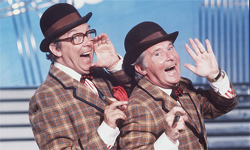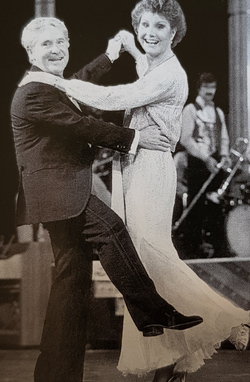Simply Eric and Ernie
2009 Article

Magazine cover

Simply Eric and Ernie

Ernie and Angela Rippon
Well, there’s a 50% chance that you were one of the estimated 28million people, over half of the UK population, who watched the Morecambe and Wise Christmas Show on BBC 1.
Never before, or since, had a light entertainment show commanded such a huge television audience. Even the Royal Family delayed their Christmas dinner to watch Britain’s most loved double act.
The show that featured a chorus of newsreaders doing South Pacific, Penelope Keith clambering down scaffolding and a lost Elton John, was the pinnacle of Eric Morecambe and Ernie Wise’s career. A career initiated by Eric’s mother, Sadie in 1941, when she suggested that Bartholomew and Wise took to the stage of the Liverpool Empire as part of the show ‘Youth Takes A Bow.’
The act was warmly received, but not the name. ’Barlow and Wise’, ‘Bartlett and Wise’ were suggested before Sadie, prompted by another act, put it to Eric to change his surname from Bartholomew to that of his birthplace, Morecambe. He agreed and Ernie thought about doing the same, but felt ‘Morecambe and Leeds’ sounded like a return train ticket, so he kept the shortened version of ‘Wiseman’ and ‘Morecambe and Wise’ was born. The name changed a couple of times when in 1942 they were joined for a short period by Jean Bamforth and became ‘Morecambe, Bamforth and Wise’, in 1948, they chose ‘Morecambe and Wisdom’ to avoid confusion with another act called Wise and Lane and in 1964, when on The Ed Sullivan show in America, the host introduced them as ‘Morey, Camby and Wise. Now we know them as simply Eric and Ernie.
In 1943 the developing act, was disrupted by National Service, but two years later Eric and Ernie reformed and joined the circus.
Lord John Sanger’s Circus and Variety Tour was an original idea in theory, put on a show in a touring circus tent that was part circus, part variety. It was a disaster. People expecting to see lions and tigers were not impressed with the old donkey and a couple of over fed hamsters, that made up the ‘circus’ or the acts that made up the ‘variety’ show, including Morecambe and Wise. The big top was packed away for good in 1947 and Eric and Ernie moved on.
Lean times followed and though Sadie worked hard for ‘the boys’ as she called them, they needed to attract an agent, so they played anywhere that they might get noticed, even at The Windmill Theatre, where being noticed over the nudes was a task in itself. They didn't last the week and were replaced by another double act that included a young Tony Hancock, but not before Gordon Novel saw them and became their first agent.
They weren’t playing the big theatres, but they were working and attracted the interest of another agent. Frank Pope supplied acts to the Moss Empires circuits, owners of 24 large theatres including the prestigious London Palladium and the infamous Glasgow Empire. Pope saw the boys in 1950 and took them on to busier times with appearances on variety shows, summer seasons, pantomimes and radio.
By 1954, both Eric and Ernie had found time to get married and star in their
first television show called ‘Running Wild’. It was a dismal failure, prompting TV critic Kenneth Bailey of The People to write’ Definition of the week: - TV set: the box in which they buried Morecambe and Wise.’
Crushed and frustrated they returned to the stage. Keeping busy refining the act helped heal the wounds, but they knew that the success they wanted lay in the very thing that was threatening the variety circuit and their livelihood, television. They had to give it another try.
Regular guest appearances on the piano-bashing. ‘Winifred Atwell Show’, eased them back on to the screen, but they were determined to have their own show. One casualty of this determination was Pope. His nine years of dedication was much appreciated, but he just didn’t have the contacts and wherewithal to progress the boys television career. Their next agent, Billy Marsh did.
In 1960, their first year with Marsh, they totalled 22 successful television appearances, including 12 times on Sunday Night at The London Palladium. It appeared that television had forgiven them for past misdemeanours.
© Best Of British and Terry Adlam 2009